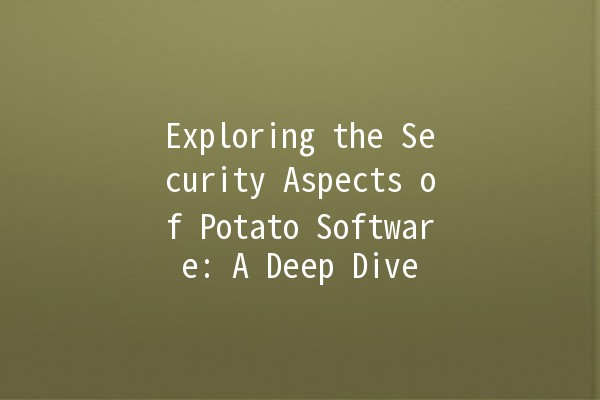In our increasingly digital world, software security is paramount. With the rise of various applications, users must understand what they are using, how it impacts their privacy, and the security measures in place. Potato software, a rising star in productivity tools, offers unique features that facilitate various tasks. However, the question remains: how secure is it? This article provides an extensive exploration of Potato software's security measures and offers practical tips for ensuring safe use. We'll also discuss the implications of security lapses and best practices for users.
Key Security Features of Potato Software

Practical Tips for Enhancing Your Security When Using Potato Software
Keeping your applications updated is crucial to security. Always check for updates and install them promptly. For Potato users, enabling automatic updates can relieve you from the hassle of manually updating the software while ensuring that you always have the latest security features.
Enhance your account security by enabling twofactor authentication. This extra layer requires you to verify your identity through a second method, making it significantly harder for unauthorized users to gain access to your account. Users can generally enable this feature within the account settings of Potato software.
Potato software allows users to control their privacy settings. Take the time to review these settings and adjust them according to your comfort level. Limit data sharing to only what is necessary for the software to function properly. If a feature does not require access to certain data, deny permission.
Ensure your password is strong and unique, mixing letters, numbers, and special characters. Avoid using easily guessable information, such as birthdays or common words. Password managers can assist in creating and storing complex passwords securely.
Be vigilant about potential phishing scams targeting your software access. Familiarize yourself with common signs of phishing attempts, such as suspicious emails or unexpected login requests. Always verify the source of any communication before responding or providing any personal information.
Frequently Asked Questions
If you suspect your account is compromised, immediately change your password and enable twofactor authentication. Monitor your account activity for any unauthorized transactions. If you notice unusual activity, contact Potato customer support for assistance. They can guide you on additional security measures and investigate any breaches.
Potato software aims to release updates quarterly, depending on the identified security vulnerabilities and feature enhancements. Users will receive notifications for new updates, and it’s recommended to install them immediately to ensure all security patches are applied.
Yes, Potato software offers offline functionality for its basic tools. However, certain features requiring cloud synchronization will need an internet connection. Always ensure that your data is synchronized correctly when you go back online to avoid data loss.
Potato software provides an option for automatic backups, but it’s essential to enable this feature in your settings. Users can customize backup frequency (daily, weekly, etc.) to align with their needs, ensuring that critical information is saved consistently.
Potato software employs AES (Advanced Encryption Standard) for data encryption, which is widely recognized for its reliability and security. This method is used to encrypt user data in transit and at rest, providing robust protection against data breaches.
As of now, Potato software has not reported any major security breaches. The team continually monitors for vulnerabilities and addresses them proactively through regular updates and community feedback. Users are encouraged to report any suspicious activity or potential security concerns directly to Potato support.
Engaging with Potato Software Community
Engaging with the Potato software community can also enhance your understanding of its security features. Community forums and user groups provide a platform for discussing concerns, sharing tips, and staying informed about recent security developments.
Users should consider actively participating in these forums to exchange knowledge and empower themselves with information from other experienced users. Engaging in discussions can also highlight any potential or discovered vulnerabilities within the software, fostering a collaborative environment focused on security.
The safety and security of your data when using software like Potato should always be a priority. By understanding the security measures in place and following best practices for usage, you can significantly enhance your data protection and ensure a smoother experience with Potato software. Stay informed, stay secure, and enjoy the productivity benefits this innovative tool offers. 🛡️🔐